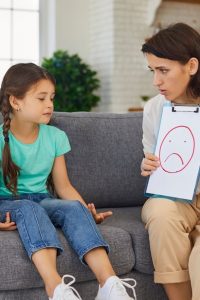By Lisa Reichelt, M.Ed., Parent Coach Champion Your Parenting
Nothing can make the pain of a trauma disappear, but you can help your child learn and grow in the face of sorrow. Trauma-Informed Parenting skills help you teach your children coping skills.
Your children may be impacted by stressful, confusing or frightening situations in life. Whether it’s dealing with the death of a loved one, a prolonged sickness, divorce, the pandemic, or the death of a pet, family tragedy seeps into everyone’s life. Traumatic events are emotionally painful.
 Love, routines, and coping skills
Love, routines, and coping skills
It’s normal to want to fix things for our kids when they’re hurting. We all remember when we could “kiss the ouchie,” and our toddler would stop crying. So, it’s normal to hyper-focus on fixing emotional pain as well. A Trauma-Informed approach begins by focusing on emotions, attachment and resiliency.
Emotions
The strong emotions caused by trauma are unfamiliar to most children. You can help your child learn to regulate all their emotions.
 Identify emotions. Teach your child to identify their emotions during happy times and sad times. Have open conversations about your emotions and theirs. Make conversations about emotions a part of your everyday life. That way, when their emotions go haywire, they’ll be able to identify and discuss emotions with you.
Identify emotions. Teach your child to identify their emotions during happy times and sad times. Have open conversations about your emotions and theirs. Make conversations about emotions a part of your everyday life. That way, when their emotions go haywire, they’ll be able to identify and discuss emotions with you.- Strategies to regulate emotions. Brain breaks, breathing exercises, yoga, and mindfulness are all tools for regulating emotions. You and your child can discover which of these tools works best for regulating their emotions. You can model the skills for them and assist them in discovering the best tool for their age level.
Attachment
Trauma can cause children to develop issues with attachment. The issue can be an over-exaggerated need to be with someone or a breaking away from close relationships.
- Foster predictability. Children find great comfort in ritual and routine. Build this into your family life if it doesn’t exist right now. Do you have a regular family meal time? A family game night?
- Create a “special” time with just one child. Set up a daily time (10-15 min) where one child and one parent have exclusive time together. Do something the child wants to do. Make it casual, fun and consistent. The key is consistency.
- Foster other caring adult relationships. Children flourish when they have many caring adults in their lives. Deliberately spend time with friends and close family members who can relate to your child. Watch for relationships that your child naturally makes and encourage them.
Resiliency
Resiliency is the capacity to recover quickly from difficulties. While some people seem to be naturally resilient, it’s a skill you and your kids can develop.
- Nurture growth mindset. Having a “growth mindset” means that you see failure as a learning experience. You embrace challenges and learn from your mistakes. Whole families can learn to have a growth mindset. Use children’s books as a tool to learn about growth mindset, and then set goals for your family to develop those skills.
- Praise versus encouragement. Parents can make a big impact on their child’s resiliency by replacing words of praise with words of encouragement. Encouragement recognizes a child’s effort. Praise often focuses just on accomplishments.
- Discipline as a resiliency lesson. Instead of handing down a punishment, have a conversation with your child. Lead them on a problem-solving discussion. How could this have worked out differently? What do you think the consequence for your behavior should be? Allow them to choose an appropriate consequence. Resiliency will develop as they take ownership for their decisions.
This is just the “tip of the iceberg” for Trauma-Informed Parenting. As with all parenting issues, knowledge is the first step. If your child is reacting to a trauma, you can make a difference in their ability to cope. Start today. You won’t be sorry.
 Lisa Reichelt, M. Ed., is a parent coach with Champion Your Parenting. She has spent her career as an educator supporting kids and parents, assisting them in developing tight family bonds. Lisa has a Master’s degree in elementary education and 40 years of experience. Her background includes work as a teacher and principal in both public and private schools. As a Parent Coach, Lisa helps families work through problems and move toward solutions. Contact her at LisaR@championyourparenting.com.
Lisa Reichelt, M. Ed., is a parent coach with Champion Your Parenting. She has spent her career as an educator supporting kids and parents, assisting them in developing tight family bonds. Lisa has a Master’s degree in elementary education and 40 years of experience. Her background includes work as a teacher and principal in both public and private schools. As a Parent Coach, Lisa helps families work through problems and move toward solutions. Contact her at LisaR@championyourparenting.com.
